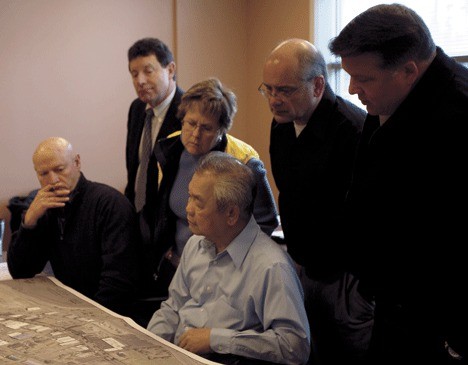A quorum of Oak Harbor City Council members likely violated the Open Public Meetings Act last week when they attended a public works standing committee meeting and discussed Pioneer Way plans.
Councilman Jim Campbell was the only member of the seven-person council who didn’t attend. He said the mayor’s office invited the entire council to the public works committee meeting, but he refused because he felt it would violate state law.
“I chose not to do that because I was concerned about having too many of the council in one spot,” he said. “I’m concerned about the Open Public Meetings Act and I’m really concerned about the perception of something not being right.”
While the city attorney strongly feels the city did nothing wrong, Assistant State Attorney General for Government Accountability Tim Ford — an expert in this area of law — agrees with Campbell’s interpretation of the act. Reached by the News-Times this week, Ford said the city should have provided proper notice of a special council meeting.
The monthly gathering was advertised as a public meeting — with three councilmen present — on the city’s Web site and on the meeting agenda delivered to the newspaper; however, it was not marked as a “special meeting of the council.”
A “special meeting” designation is required if the majority, or a quorum, of council members are expected to attend, according to the Open Public Meetings Act.
After reviewing the meeting agenda, Ford said it was proper notice of a committee meeting, but that’s entirely different than a full council meeting.
“I don’t know of any authority in statute or case law that concludes that notice of a committee meeting meets the requirements for notice of a council meeting,” he said. “But if that were the case, then I would prefer that notice for both the council and the committee be provided for the same meeting.”
“What I would suggest is that they re-do it,” he added. “That’s my interpretation of the law.
Ford’s role in the Attorney General’s Office is to provide assistance to the public and agencies for compliance with the Public Records Act and the Open Public Meetings Act, but not to investigate or enforce possible violations.
In a phone interview with the Whidbey News-Times, City Attorney Margery Hite strongly defended the city. She said the notice that was given for the three-member committee meeting was adequate.
But Ford, who discussed the matter with Hite, disagreed. He indicated Hite was rather upset with him.
“Again, if a majority of the council wants to attend the committee meeting, then it should be noticed as a special meeting of the council. However, the notice was not for a meeting of a majority of the council. The notice specifically identified only three of seven council members who would be present,” he said. “The city attorney told me repeatedly that she had not seen the notice. However, it didn’t seem to matter that she hadn’t seen the notice as she was convinced that nothing was wrong.”
Ford called the Municipal Research and Services Center to clarify the issue.
“They agreed that the meeting should be noticed as a special meeting of the council,” he said.
In a letter to Ford, Hite argued that the meeting was advertised as a “special open public meeting.” The advertisement itself does not use the word “special,” but states it is a “public works and utilities standing committee.” It identified three councilmen: Danny Paggao, Rick Almberg and Scott Dudley.
“The City of Oak Harbor respectfully disagrees with your interpretation of the Open Public Meetings Act,” Hite wrote.
Hite continued, “While the notice of the special meeting indicated it was a meeting of the Public Works Standing Committee, the Public Works Standing Committee is either not covered by the Open Public Meetings Act at all (because it is not the governing body of any public agency) or it is covered because it is a meeting of the City Council.”
Hite wrote that the city conducted its standing committee meetings based on advice gleaned from the state Attorney General’s Office approximately two years ago.
“On your advice, the City began noticing the standing committee meetings as special meetings and city council members were not excluded if a quorum resulted since the meetings were open and publicly noticed,” she wrote.
In an interview with the Whidbey News-Times, Hite called Ford’s stance “puzzling.”
“It’s a very peculiar thing for an attorney general to do without hearing both sides,” she said. “It’s very unusual as a process goes and it’s somewhat surprising.”
During the meeting, council members Paggao, Almberg, Dudley, Beth Munns, Jim Palmer and Bob Severns discussed the Pioneer Way downtown revitalization project design with city engineers.
Mayor Jim Slowik also attended the meeting in question and was unaware that the council was in possible violation of the Open Public Meetings Act.
“I still don’t think we’re in violation,” he said in a telephone interview Thursday morning. “One of the main things I wanted to do is open up city government and make it accessible. I’m finding out it’s harder than I thought.”
The mayor insists that he’s in favor of open city government, and will continue to further improve the transparency of Oak Harbor city government through taped meetings, minimal use of executive (closed) sessions and proper meeting notice.
Slowik started the standing committees after taking office. At the time, some community members argued that the committee meetings were a way for council members to discuss issues outside of televised council meetings.
After Ford discussed the issue with Hite, his interpretation remained the same.
“I stand by my opinion that they should re-do the meeting,” Ford said. “They should provide notice of a new special meeting of the council and allow the public the opportunity to view the deliberations of the council.”



